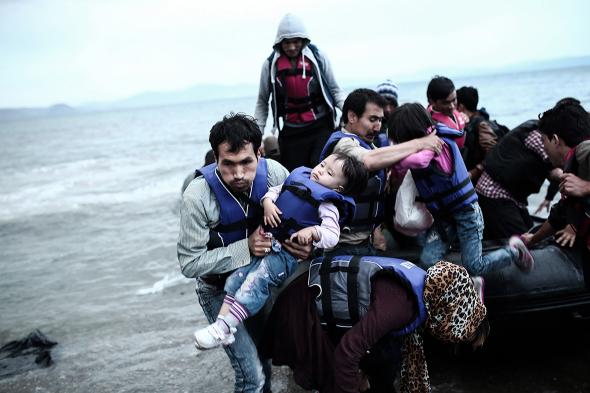
The images, shot off the Libyan coast, are so powerful, including shots of bodies below decks of the overloaded fishing boat, that many in the Berlin festival audience gasped during the screening.
Four-year-old Afghan boy dies on migrant boat
The Eritrean-born Italian director, whose films often focus on interesting or quirky people, said he filmed for a year on the Italian island of Lampedusa, which has become a landing site for refugees due to its proximity to north Africa.
He also went out on patrol with Italian naval vessels, searching for refugee boats. On one such patrol, he came face to face with a boat crammed with hundreds of refugees, many already dead after only five hours at sea.
He said that at first he had a feeling of shame - he used the Italian word "pudore" - and was of two minds whether he should film what was happening.
"I said I cannot film that but there the tragedy was in front of me and I was like moving myself to try not to look at what was happening in front of my eyes," Rosi told Reuters.
"And then I say I have to show this because it's like being after the war (World War Two) in front of a gas chamber and not filming that because it was too harsh, that scene.
"These people died with the fume of the gas of the engine, and this happens every day, things like that," he said.
Sweden plans to house migrants on cruise ship
Rosi's film counterbalances the "fire at sea" with a depiction of daily life on Lampedusa, mostly as seen through the eyes of a young boy named Samuele Caruana, who was 10 at the time of filming.
Caruana likes to make slingshots which he and a friend use to shoot at cactuses which they have cut out to create faces. They bandage up some of their cactus "victims" -- much as Rosi says the world allows the refugee crisis to explode at its source and deals with the aftermath.
"We are all responsible for this tragedy that is in front of our eyes," Rosi said. "The film doesn't give any answer to that but hopefully creates an awareness of that."
Rosi, whose film "Sacro GRA" won the top prize at the Venice Film Festival in 2013, is entered in the main competition of 19 films seeking the top Golden Bear prize awarded on Saturday.
1725354252-0/Untitled-design-(5)1725354252-0-405x300.webp)
1732099866-0/adele-(3)1732099866-0-165x106.webp)




1732079997-0/BeFunk_§_]__-(7)1732079997-0.jpg)


1732090878-3/Untitled-design-(22)1732090878-3-270x192.webp)







COMMENTS (1)
Comments are moderated and generally will be posted if they are on-topic and not abusive.
For more information, please see our Comments FAQ